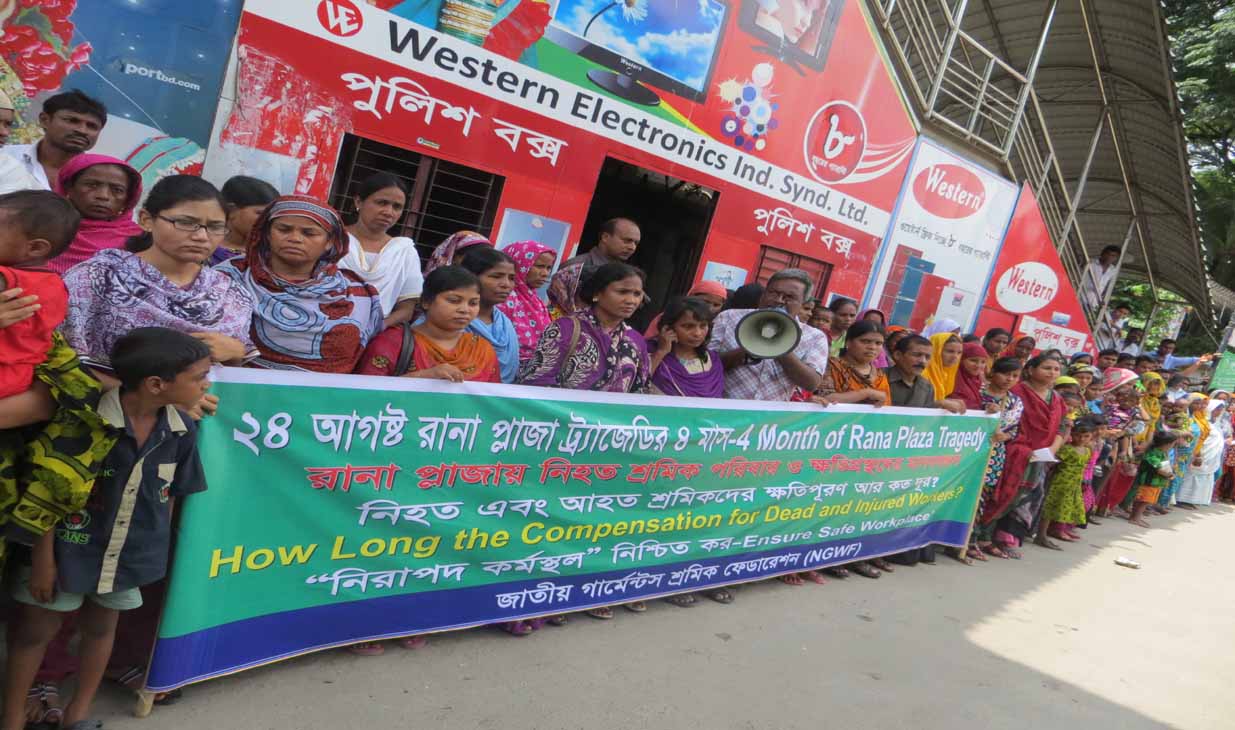WELCOME TO THE ARCHIVE (1994-2014) OF THE MAQUILA SOLIDARITY NETWORK. For current information on our ongoing work on the living wage, women's labour rights, freedom of association, corporate accountability and Bangladesh fire and safety, please visit our new website, launched in October, 2015: www.maquilasolidarity.org
September 16, 2013

Almost five months after the collapse of the Rana Plaza building in Bangladesh, only nine of the twenty-nine brands invited to discuss compensation for the victims showed up for a meeting convened by IndustriALL Global Union and chaired by the International Labor Organization (ILO).
The April 24 building collapse was the worst industrial disaster in Bangladesh history, killing over 1,100 garment workers and injuring over 1,600 others. To date, the victims have received little or no compensation. Since 2006, over 1800 people have been killed as a result of substandard safety conditions in Bangladesh factories.
The meetings, which took place on September 11th and 12th in Geneva, set in motion plans to create a joint fund to deliver compensation to injured workers and the families of those who died in the Rana Plaza incident and the Tazreen factory fire that killed 112 workers in November 2012.
Companies that took part in the discussions included Canadian retailer Loblaw (owner of Joe Fresh), Primark of the UK, Kik of Germany, and El Corte Ingles of Spain. Companies linked to factories in the Rana Plaza building that refused to attend included Walmart, JC Penney, Benetton, and The Children’s Place. Also participating in the meetings were representatives of the Clean Clothes Campaign, the Worker Rights Consortium, and the Government of Bangladesh.
Based on a formula developed in 2005 following a similar collapse at the Spectrum factory near Dhaka, Bangladesh’s capital city, the compensation proposal put forward by IndustriALL and the labour rights NGOs would provide monetary compensation for pain and suffering, income loss, schooling for children, and medical treatment and rehabilitation.
For Rana Plaza and Tazreen victims, this would obligate brands to contribute US$33,556,996 and US$2,899,000 respectively, just under half of the total compensation required, with government and factory owners contributing the rest.
“Crocodile tear,” is what Worker Rights Consortium Director Scott Nova calls the false sympathy for the victims expressed by companies like Walmart immediately following the disaster, companies that are now refusing to contribute to the compensation fund.
Walmart, which sources from roughly 280 factories in Bangladesh has also refused to join with 90 other major retailers and brands in signing the Accord on Fire and Building Safety in Bangladesh, which will establish an independent building inspection program in order to prevent similar disasters from happening in the future. Instead, Walmart has joined with Gap in setting up an alternative company-controlled factory auditing program.
In contrast, Loblaw and Primark have demonstrated their commitment to the formal compensation process and have signed the Accord. Primark has also set up an emergency fund to provide immediate support to workers and families who have been affected by the Rana disaster.
The compensation talks are set to resume within two weeks of the initial meetings. MSN will continue to monitor this situation and will work with our counterparts internationally and in Bangladesh to ensure that companies provide just compensation for the victims of the Tazreen and Rana Plaza disasters and take adequate preventive measures to ensure that such tragedies do not take place in the future.